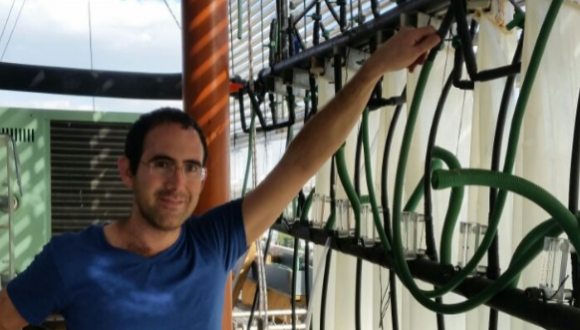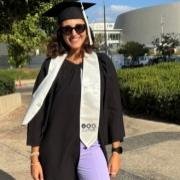Meiron Zollmann granted a Manna Center for Food Security Fellowship for 2018-2019
Meiron, a PhD student at the Environmental Bio-Engineering laboratory research group under the direction of Dr. Alex Golberg, was granted the Manna Food Security Fellowship following his research
Meiron Zollmann's research in the environmental bioengineering laboratory, under the direction of Dr. Alex Golberg of the Department of Environmental Studies and Prof. Alex Liberzon of the Faculty of Engineering, focuses on Offshore Macroalgae Based starch and protein production: developing a model and experimental approach for the supply of critical nutrients.
Meiron explains that the world’s population is expected to grow to nearly 10 billion by 2050, boosting agricultural demand by about 50 percent compared to 2013 as reported by the Food and Agriculture Organization of the United Nations (FAO), 2017 . An alternative potential source of starch, protein and food additives is in macroalgae which could be cultivated in the ocean, utilizing wide offshore areas for food production. This resource is resilient to fresh water scarcity in dry areas and seasons and to land degradation and can increase food security.
The local Ulva and Gracilaria macroalgae species have high growth rates and varying protein and starch contents. In many ocean regions, including the Eastern Mediterranean Sea, the productivity of macroalgae cultivation is limited by nitrogen availability and depends on external nitrogen supply, similarly to the dependence of terrestrial agriculture on fertilization.
Terrestrial agriculture has been recently transformed by precision agriculture (PA), improving productivity, fertilization efficiency and sustainability by implementing fertilization models accompanied by online sensors. These models enable to plan when and how much to fertilize for maximal yields and fertilization efficiency. The adjustment of PA techniques to macroalgae could offer smart and efficient offshore fertilization solutions, enabling to increase yields and control chemical composition.
Meiron's study addresses the need to develop macroalgae fertilization models by studying the rate at which macroalgae accumulate nitrogen, grow and produce proteins and starch in time varying nitrogen mass flow rates in controlled bioreactor and real sea conditions. The successful completion of this study is expected to help plan production, thus promoting offshore macroalgae cultivation as an alternative, resilient, food resource.
At the Manna center at the Faculty of Life Sciences, Tel Aviv University, Meiron will participate in seminars, conferences, colleagues meetings and events throughout the year. The multidisciplinary collaboration between the researchers will enable the enrichment and deepening of research aimed at finding practical solutions to the challenges of food security.





